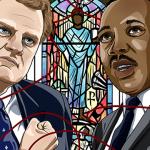In the wake of yesterday’s tragic shooting of U.S. Representative Gabrielle Giffords no small number of commentators were quick to lay blame for the climate in which this kind of thing could happen at the doorstep of millions who differ with Ms. Giffords’s views. I find that troubling — not because I share those views — but because it points to a general decline in thoughtful, judicious political conversation.
The murderer who perpetrated these crimes is, by all accounts, criminally insane. Others may be convinced that he represents a coherent point of view. But based upon the early reports that I have read about Mr. Loughner, I can find no reason to believe that we will ever obtain any information that will provide a rational explanation for his utterly irrational, indiscriminate, and criminal behavior. Like Timothy McVey and others, his views are a chaotic combination of fear and prejudices. In another day and age he would have been branded as demon-possessed. There are others like them out there, but — thankfully — they are in the minority.
But the sweeping editorializing that claimed to understand the inner workings of this madman’s mind and then attributed them to millions of other Americans is not. It is widespread, common on both ends of the political spectrum, and far more dangerous.
For people on both the left and right, the politics of leverage has fostered a climate in which it is fair game to demonize others using the behavior of the demon-possessed. And that practice imperils the very structures that have made our democratic way of life possible. At every twist and turn in political debates with one another, those who cherish the gift we have been given in this democracy of ours bear two responsibilities: thoughtful advocacy for a point of view and vigorous advocacy for the civil, respectful climate in which that advocacy is possible.
The great danger in the current political climate is that far too many are tempted to believe that the advocacy for a point of view is of preeminent importance. It is not. It is the defense of liberty that transcends the debates of the moment. If we allow cynicism or fervor for a point of view to undermine the strength of our advocacy for freedom of expression, then we will have all lost.
Is there a spiritual issue here? Yes.
As a Christian, I am convinced that advocacy for a civil, respectful climate reflects the freedom that God gives to all of us. I also believe that God’s way of working in our lives is never coercive. So, to the extent that our national life preserves freedom and avoids coercion, the potential for us to thrive in God-given ways is also preserved.
That makes a difference in the way I engage political issues. And while I don’t always succeed, there are three things I try to do:
- I resist the temptation to argue that our national life should conform my understanding of the Gospel.
- I resist the temptation to argue that my political views and the will of God are one in the same.
- And I try not to demonize others, using the behavior of the demon-possessed.
It is not simply the liberty of expression that is at stake. It is the liberty of our souls.
Fred Schmidt blogs at his Patheos Expert site here, and is a regular columnist on the Mainline Protestant Portal, here.















